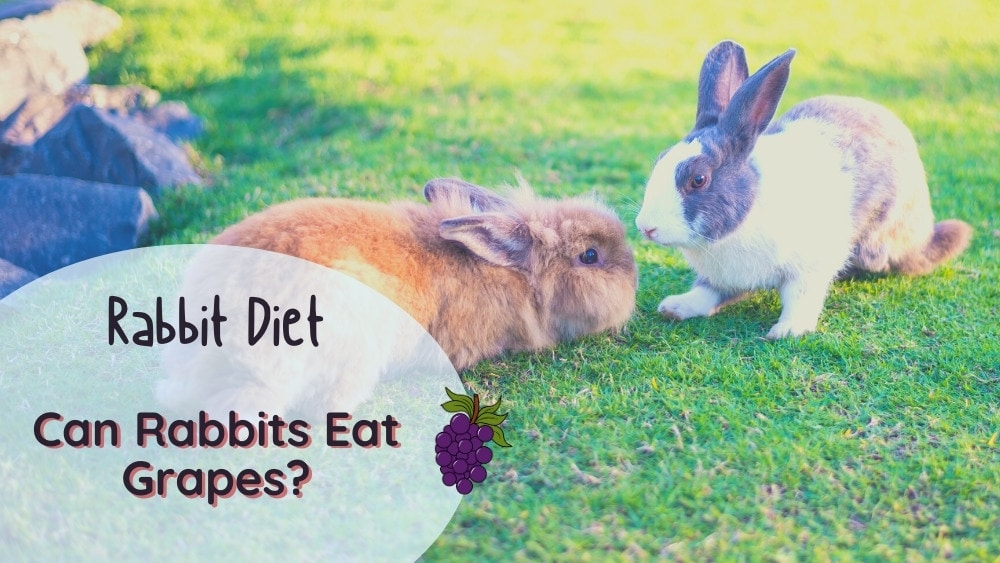Most rabbits have a sweet tooth and appreciate sugary treats – so it’s not uncommon for rabbit owners to wonder which sweet fruits they can give their rabbits.
We know that rabbits are delicate animals with a specialized digestive system that allows them to effectively process plant materials. We also know that most wild rabbits do not have access to grapes in their natural habitats, but our domestic rabbits would happily consume grapes or any other fruit treats they can get access to.
And when it comes to grapes, you may have heard that they are poisonous to cats and dogs. This begs the question, can rabbits eat grapes, or are grapes bad for rabbits?
In this article, we’ll cover all the advice I give my clients about feeding grapes to their rabbits, including:
- Are grapes safe for rabbits?
- How to feed grapes to your rabbit
- Nutritional benefits of grapes
- Risks of feeding your rabbit grapes
- What to do if your rabbit eats too many grapes
- Alternatives to grapes in a rabbit’s diet
So if you’re wondering whether to introduce grapes to your bunny’s diet, you’re in the right place. Let’s go!
Can Rabbits Eat Grapes?
Rabbits can eat grapes, but in moderation. Grapes are a high-calorie fruit and contain a lot of water and sugar. Feeding your rabbit too many grapes can result in digestive upset and other health issues. Limit your pet rabbit to one or two grapes, once a week or less.
Are Grapes Safe for Rabbits?
Grapes are not toxic to rabbits like they are to dogs and cats, so it’s safe to feed your pet rabbit grapes occasionally as a treat. However, there are still some safety concerns.
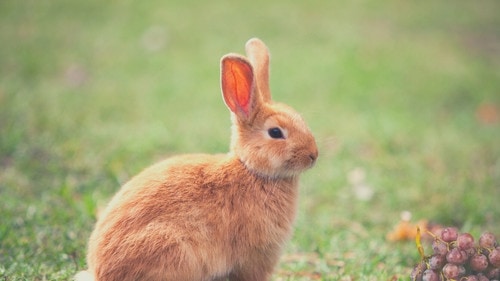
Firstly, because grapes are susceptible to disease and damage by pests, most commercial grapes are grown with chemicals. This means they’re sprayed with insecticides, pesticides, or herbicides which may be toxic to your pet.
If you buy commercial grapes, wash them properly, before feeding them to your rabbit.
To be on the safe side, it’s better to buy organically grown grapes, as these are safer for both you and your pet bunny.
Depending on the climate where you live, you can also consider growing them yourself for good measure.
Secondly, grapes and their seeds can present a choking hazard to rabbits. Always cut the grapes in half and remove any seeds before feeding.
Thirdly, baby rabbits and juveniles under one year should not consume grapes, as their digestive systems are too sensitive.
How to Feed Your Rabbit Grapes
Apart from safety concerns, the most common questions I hear in clinics are how do you feed your rabbit grapes? And how many grapes can you give it at a time?
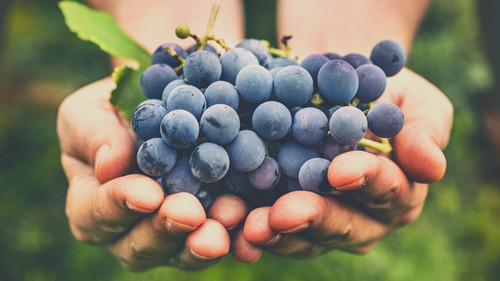
In terms of how to feed the grapes, here’s my advice:
- Grapes should be washed thoroughly before feeding them to rabbits. Even if you buy organic, there might be bacteria or residue on the grapes, so wash them well.
- Cut the grapes in half and remove the seeds before giving them to your pet rabbit, just as you would for a toddler.
- If you are introducing grapes to your rabbit’s diet, do so slowly. Start with half a grape, and monitor for 2-3 days to see how its body reacts. If your rabbit shows unusual symptoms such as diarrhea or bloating, this means its digestive system didn’t take to the fruit, and you should not give it more.
- If your rabbit shows no abnormal symptoms, then it is safe to include grapes in the fruit or treat portion of their diet, once or twice a week.
Nutritional Benefits of Grapes
Grapes are a good example of nutrient-packed fruits. They contain several vitamins, minerals, and antioxidants that can be beneficial to your rabbit. For example,
one cup of grape juice contains:
- Calories – 62
- Fiber – 0.8 grams
- Proteins – 0.6 gram
- Carbs – 16 grams
- Sugar – 15 grams
Grapes also contain other important nutrients like vitamins A, B6, and C as well as minerals such as magnesium, potassium, and iron.
It is, however, worth noting that, when it comes to sugary treats for rabbits, less is more.
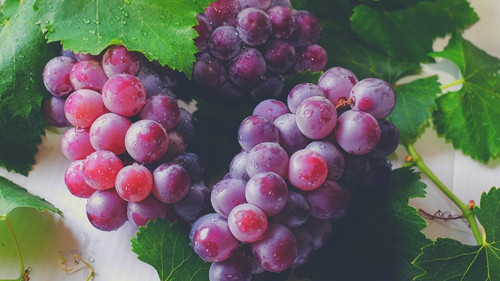
The high sugar and water content of grapes can upset the balance of bacteria in the rabbit’s stomach, and cause digestive issues like diarrhea, gas, and bloating.
Risks Associated with Feeding Your Rabbit Grapes
Fruits, including grapes, are generally high in carbs and sugar. So, while it is safe to give your rabbit grapes occasionally, feeding it too many can result in a number of problems, such as the following:
Gastrointestinal issues
Rabbits have a sensitive digestive system that can be upset by consuming an excessive amount of grapes, due to their high sugar content. This is why it is not advisable to make them a regular part of your rabbit’s diet.
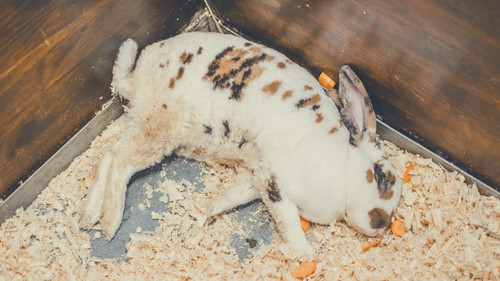
Common issues include gas, bloating, diarrhea, and gastrointestinal tract stasis (GI stasis).
GI stasis is a situation in which your rabbit’s digestive system stops moving food through the tract. This can be fatal for your rabbit if not treated immediately.
Obesity
The high sugar and calorie content in grapes can cause your rabbit to gain excess weight. Being obese or overweight is as bad for rabbits as it is for humans, and can lead to liver and kidney problems or even heart attack.
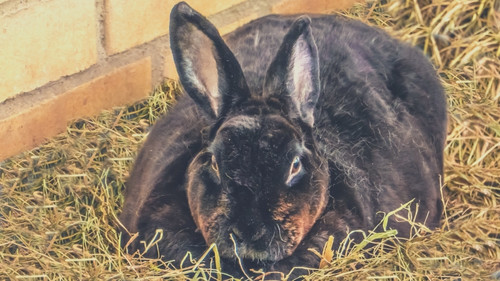
Refusing healthier low glycemic food
If your rabbit gets used to eating grapes, they may start refusing their healthier, high-fiber food like hay and leafy greens. Rabbits do have a sweet tooth and would prefer you give them more sweet treats.
What to Do if Your Rabbit Eats Too Many Grapes
Generally, grapes should be fed to rabbits in moderation and only occasionally. If your rabbit happens to eat a large number of grapes, it’s important to monitor to see if the rabbit shows signs of sickness or pain.
You should watch for:
- signs of pain, such as teeth grinding, being less active, or sitting in a hunched position
- digestive symptoms like diarrhea, a lack of poop, or stomach bloating
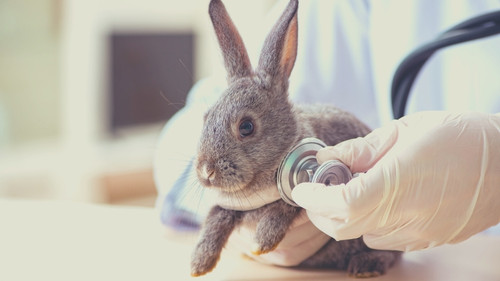
If you notice these symptoms, contact your vet immediately, as your rabbit might need emergency treatment.
Rabbits cannot vomit, so once those grapes are in your rabbit’s stomach, the best we can do is support the rabbit if it gets sick.
What Part of Grape Plants can Rabbits Eat?
Rabbits are herbivorous, so you may be wondering whether other parts of the grape plant are ok to feed to your rabbit.
Here’s a breakdown of the parts you can feed your rabbit, and how to feed them.
Can rabbits eat grape leaves?
Rabbits are herbivorous, hence, they can eat grape leaves. Some may even argue that this is the best part of the fruit for your rabbit. However, it is important to wash them properly to get rid of dirt.
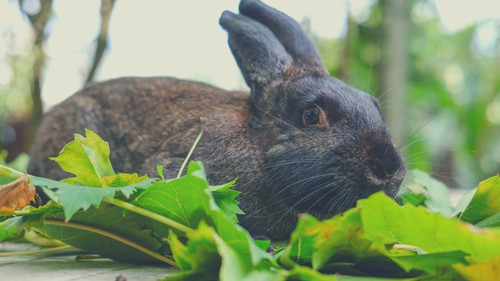
Also, ensure you feed your bunny fresh leaves that have not been sprayed with pesticides or insecticides.
Can rabbits eat grape stalks?
Yes, rabbits can consume grape stalks or stems. Again, it’s important to wash them properly.
Can rabbits eat grape vines?
Yes, rabbits can eat grape vines as long as they are clean.
Can rabbits eat grape seeds?
Grape seeds are not toxic for rabbits, but your rabbit may choke on them. It’s best not to feed your pet rabbit grape seeds, either by removing the seeds or feeding your rabbit seedless grapes.
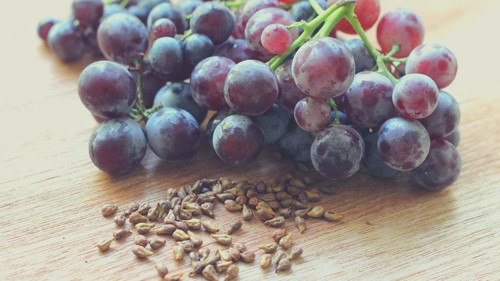
Alternatives to Grapes in a Rabbit’s Diet
Grapes should not be a regular part of your rabbit’s diet. You should aim to be feeding fruit treats once or twice a week at most.
The good news is that rabbits can enjoy a wide range of other foods that don’t contain too much sugar and offer great health benefits.
A balanced diet for rabbits should ideally consist of 80-90% hay and 10-20% fresh vegetables and rabbit pellets, with fruit making up two small portions twice a week.
Here are examples of leafy greens and other fruits that can serve as better alternatives to grapes in your rabbit’s diet.
- Apples
- Cherries
- Apricots
- Watermelon
- Basil
- Bib and butter lettuce
- Romaine lettuce
- Spinach
- Carrot tops
- Turnip greens
- Cabbage
You can check out more bunny diet advice in our specialized rabbit diet guide!
FAQs
Can baby rabbits eat grapes?
No, baby rabbits should not eat grapes or any other fruits until they are at least one year old.
Your bunny’s diet should strictly be confined to its mother’s breast milk and a little alfalfa hay during the first four months, after which you can start to introduce rabbit pellets and fibrous green vegetables.
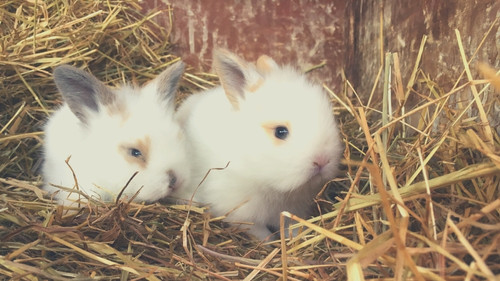
Fruits should not be introduced in the first year because the baby rabbit’s digestive system is still getting used to adopting the adult diet of hay, pellets, and vegetables.
Can rabbits eat raisins?
Adult rabbits can be fed raisins occasionally as a treat. Raisins or dried grapes have lost almost all their water content and contain about four times the amount of sugar as grapes, so feed them sparingly, if at all.
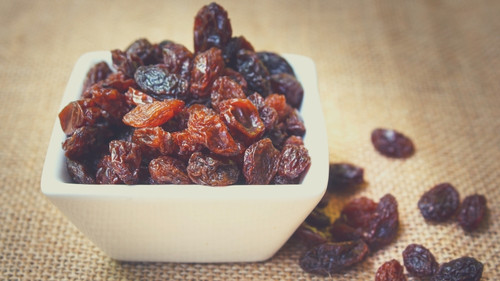
Also, the raisins you feed to your pet should be natural. They should not contain an extra layer of sugar or candy, as these will further increase the sugar content.
If your rabbit consumes too many raisins, it may get a stomach upset. In the long term, the high sugar content can contribute to obesity.
Can rabbits drink wine?
No, rabbits should not drink wine because most wines contain alcohol. Alcohol acts as a toxin, and the tiny livers of rabbits cannot process it effectively.
In fact, no pets should drink alcohol, as it carries a risk of liver failure.
Stick to giving your rabbit fresh water and, sometimes, a small amount of fruit juice that does not contain preservatives.
Conclusion
Grapes have great nutritional value and can be fed to adult rabbits as an occasional treat. You should limit it to one or two grapes once a week, and wash them properly to reduce the chances of your rabbit ingesting pesticide residue. Make sure your rabbit isn’t turning down their hay and leafy greens in preference for treats!
Remember that grapes are exceptionally high in carbs and sugars which can cause digestive problems for your rabbits, including diarrhea, bloating, or GI stasis. Consult your vet immediately if your pet rabbit shows abnormal symptoms after consuming table grapes.
If you found this article useful as a rabbit owner, feel free to share it with your friends who also have pet rabbits. If you have any questions about your rabbit’s diet, leave them in the comment section below.


